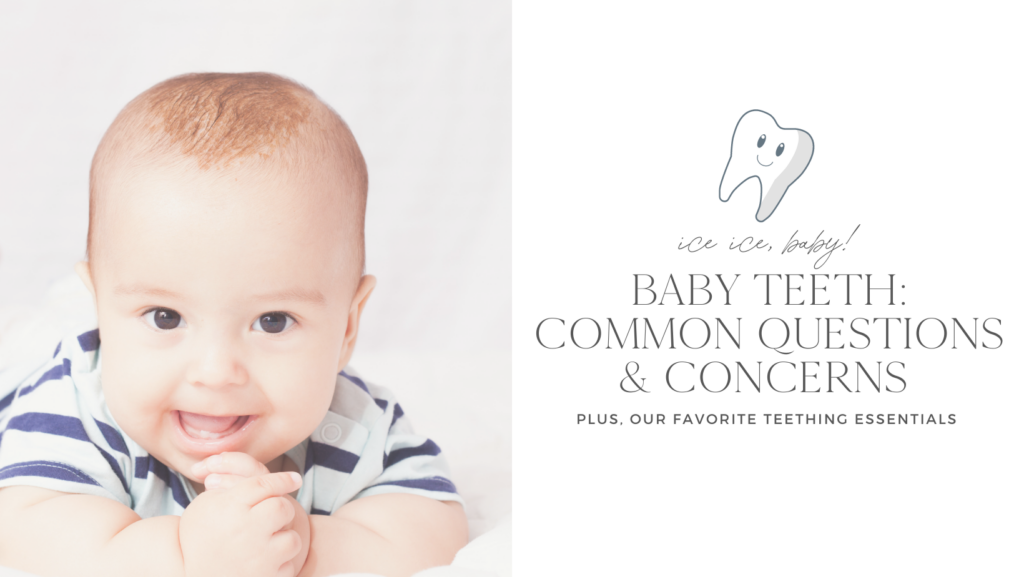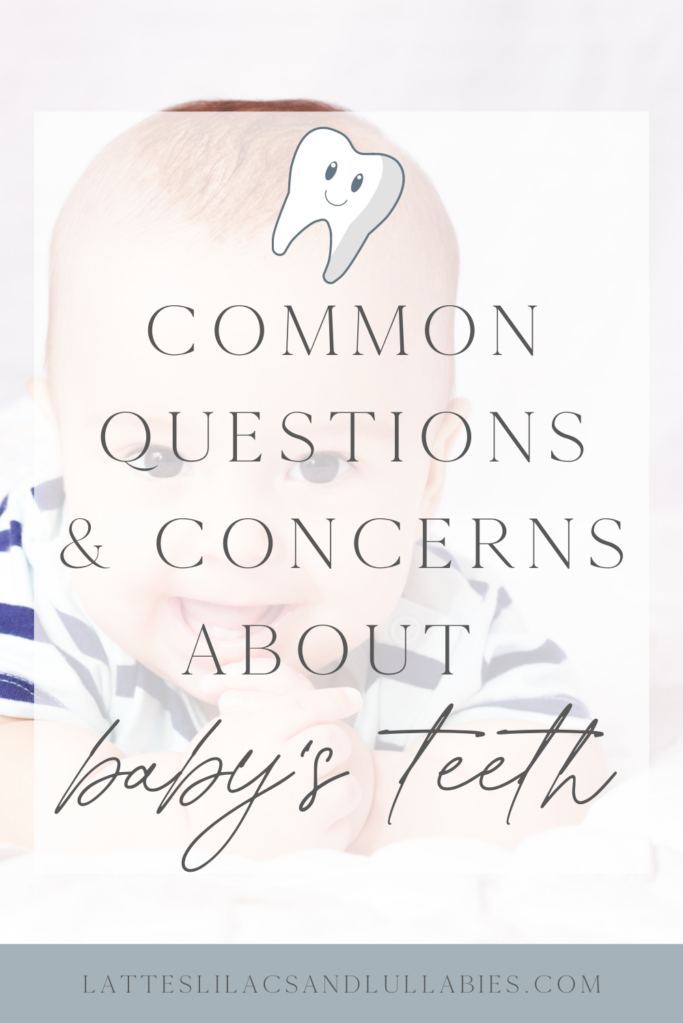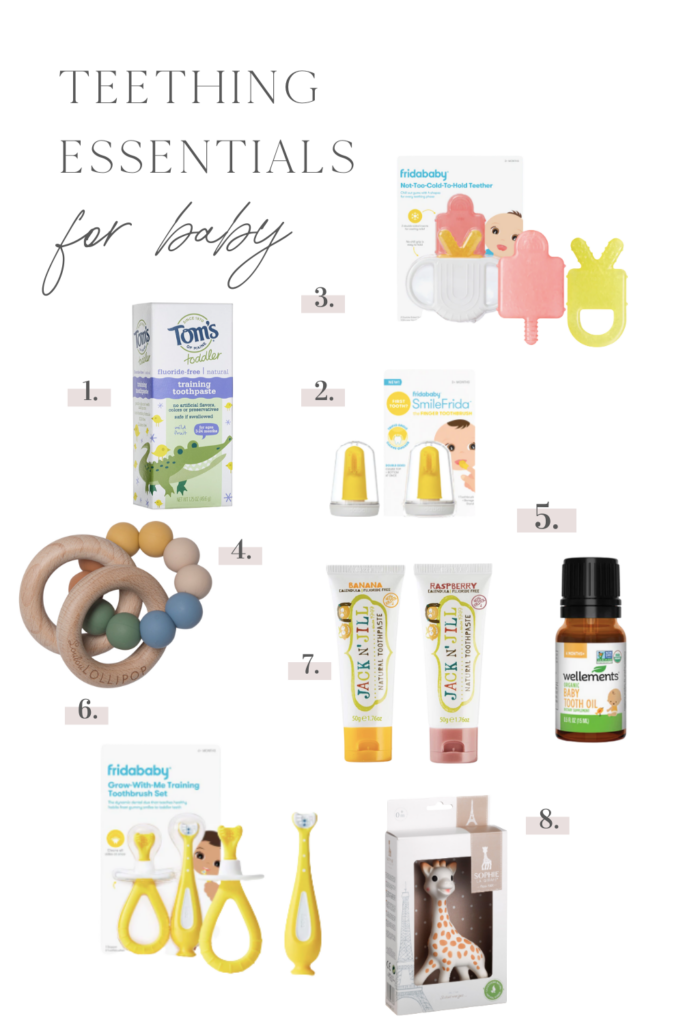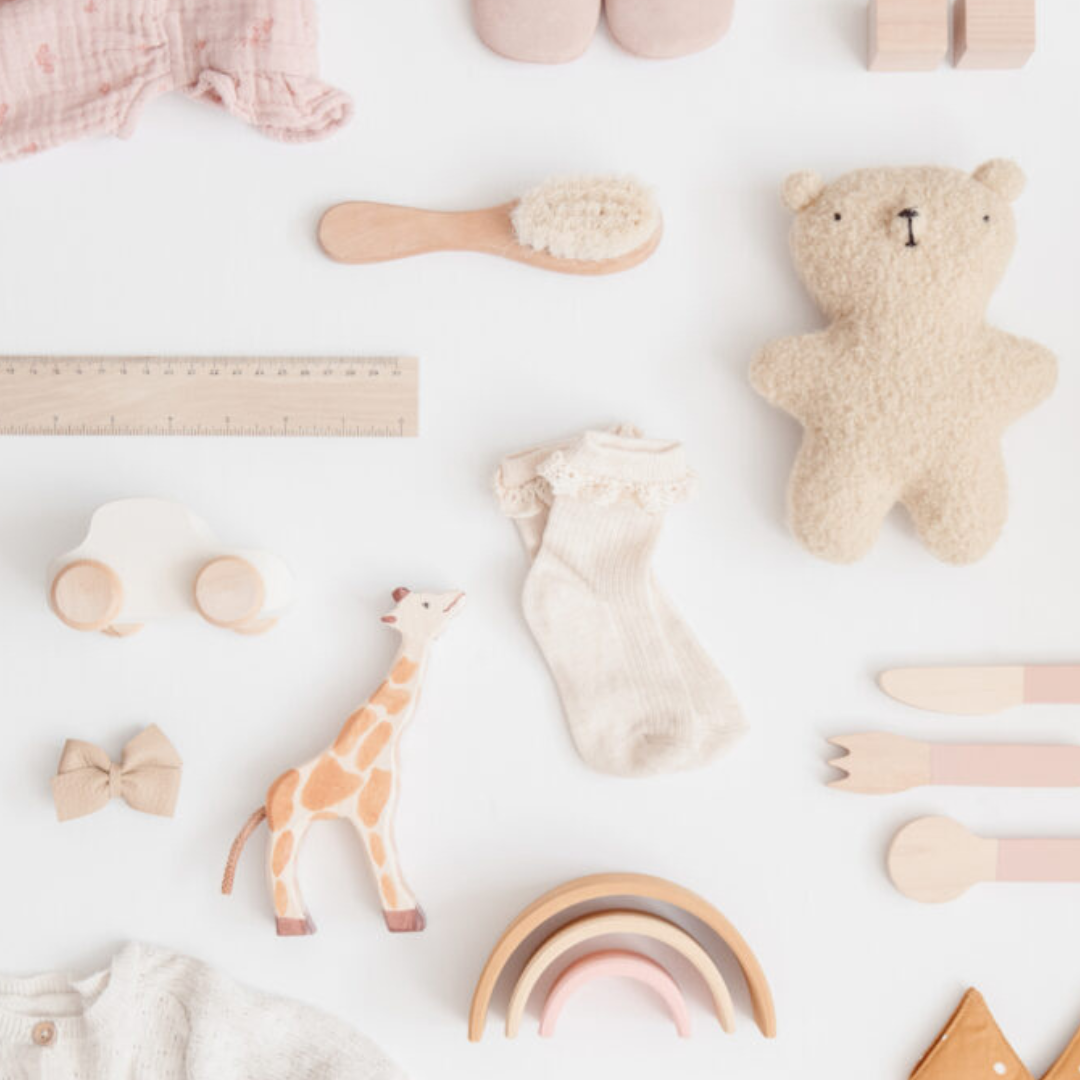
Your child’s baby teeth may be discolored gray, brown, or black and you may be wondering why. This is perfectly normal and there is no need to worry. In this blog post, we will discuss the reasons for baby tooth discoloration and how to properly care for them. Plus, I’ll share all of our baby teeth essentials so you can properly care for your baby’s pearly whites.
{We are a participant in the Amazon Services LLC Associates Program, an affiliate advertising program designed to provide a means for us to earn fees by linking to Amazon.com and affiliated sites. To learn more about affiliate links, click here!}

Baby Teeth vs. Adult Teeth
Most babies are born with a full set of 20 baby teeth, which begin to erupt around six months of age. These primary teeth eventually fall out and are replaced by permanent teeth, a process that is complete by the age of 12 or 13.
While your child’s teeth may seem like small versions of adult teeth, there are actually some significant differences between them.
For one thing, baby teeth are much more susceptible to cavities and decay. This is because they are softer and have thinner enamel, making them more vulnerable to the bacteria that cause tooth decay.
In addition, baby teeth are also smaller in size, which can make them appear out of proportion to the child’s mouth. Eventually, however, the child’s permanent teeth will come in and give them a smile that is just as healthy and beautiful as an adult’s.
“Why Are My Baby’s Teeth Discolored Gray?”- & Other Common Concerns Related to Your Baby Teeth
Parents are often alarmed to find that their baby’s teeth are discolored. While tooth discoloration is usually nothing to worry about, it can be a sign of a more serious problem. If you are concerned about your baby’s teeth, talk to your doctor or dentist. They will be able to assess the situation and provide you with the best course of action.
Here are some common reasons your baby’s teeth may be discolored…
Stains from Food &/or Drinks
When a child eats or drinks foods and liquids that contain color pigments, these pigments can attach to the surface of the teeth and cause tooth staining. Tooth staining can occur on both the inner and outer surfaces of the teeth, and it can range from barely noticeable to quite dark.
The good news is that most surface stains can be removed with regular brushing and flossing. However, if the staining is more severe, you may need to consult a dentist. Tooth staining is not just a cosmetic issue – it can also indicate a more serious problem with the tooth enamel.
If you’re concerned about your child’s teeth, be sure to talk to your dentist. They’ll be able to assess the situation and recommend the best course of action.
Recent Oral Injury
If your little one injures their teeth, you may be worried about the dental trauma and may notice that the child’s baby teeth start to discolor. This is because when a child injures their adult teeth, the blood from the injury can seep into the dental pulp. This can cause the teeth to discolor, and in some cases, the child’s adult teeth may even fall out.
If this happens, it’s important to see a dentist as soon as possible. In some cases, the dentist may recommend that the child’s baby teeth be removed so that the permanent teeth can come in correctly. However, if the child’s adult teeth are not injured, they should eventually come in without any problems.
Improper Oral Hygiene
We all want our children to have healthy, shining teeth. But sometimes, despite our best efforts, baby teeth can become discolored. There are several reasons why this may happen, but one of the most common is poor oral hygiene.
When children don’t brush their teeth properly or often enough, plaque can build up on the surface of their teeth. This plaque can then harden into tartar, which is much more difficult to remove. As tartar accumulates, it can begin to discolor the teeth, making them yellow or brown. So if you want to keep your child’s teeth looking their best, make sure they’re brushing regularly!
Tooth Decay (AKA Cavaties)
Baby teeth may be small, but they’re just as susceptible to decay as adult teeth. The first signs of tooth decay are small white or dark spots on the teeth. If left untreated, these spots can become large cavities that cause pain and infection.
As parents, we can help protect our children’s teeth by taking them to see a pediatric dentist and practicing good oral hygiene at home. This means brushing their teeth twice a day with fluoride toothpaste and flossing once a day.
It’s also important to limit sugary snacks and drinks, as these can contribute to tooth decay. By taking these steps, we can help our children develop strong, healthy teeth that will last a lifetime.

How To Properly Care for Your Baby’s Teeth
When it comes to dental care, babies have different needs than adults. Here are some tips for taking care of your child’s teeth:
-Use a child-size toothbrush with soft bristles.
You can start using fluoride toothpaste when your child is two years old. Be sure to supervise your child while brushing and flossing to prevent them from swallowing toothpaste.
-Take your child for regular dental checkups.
The American Academy of Pediatric Dentistry recommends that children visit the dentist by their first birthday.
“After the first tooth comes in and no later than the first birthday. A dental visit at an early age is a “well-baby checkup” for the teeth. Besides checking for cavities and other problems, the dentist can show you how to clean the child’s teeth properly and how to handle habits like thumb sucking.”
American Dental Association
-Start teaching your child healthy habits early on
Help them to understand why it’s important to brush and floss regularly. Allow them to choose their own toothbrush and toothpaste so that they’re more likely to use it.
By following these tips, you can help to ensure that your child has a healthy smile for years to come.
Baby Teeth Essentials
Parents have a lot to think about when it comes to their child’s health, and dental care is no exception. Just like adults, children need to brush their teeth twice a day and floss once a day. However, there are a few extra steps that parents need to take to ensure their child’s dental health.
For instance, it’s important to start cleaning your baby’s teeth as soon as they come in. You can use a soft cloth or toothbrush designed for infants.
It’s also important to avoid putting your child to bed with a bottle of milk or juice. The sugar in these drinks can cause cavities.
And finally, be sure to take your child to the dentist for regular checkups. With just a little bit of effort, you can help ensure that your child grows up with healthy teeth!
Here are a few of our favorite baby teeth essentials…
- Tom’s Training Toothpaste
- FridaBaby Finger Brush
- FridaBaby Not Too Cold To Hold Teethers
- Lou Lou Lollipop Bamboo & Silicone Bead Teether
- Wellements Baby Tooth Oil
- FridaBaby Grow With Me Training Toothbrush
- Jack ‘N Jill Natural Toothpaste
- Sophie the Giraffe Teething Toy

FAQs Regarding Baby Teeth
Q: Why are my baby’s teeth turning grey?
Wondering why your baby has discolored teeth? First of all, it could be simply due to the fact that baby teeth are softer and more porous than adult teeth. This makes them more susceptible to staining from things like food and drink.
It’s also possible that the tooth discoloration is caused by a buildup of plaque or tartar. If you suspect this is the case, it’s best to consult with a dentist. In most cases, however, there’s no need to be alarmed over your baby’s discolored baby teeth.
Q: Can a grey baby tooth turn white again?
So, can a grey baby tooth turn white again? The answer, unfortunately, is no. Once a tooth has been stained or discolored, it’s Permanent.
That said, there are some things you can do to prevent your child’s teeth from turning grey in the first place. For instance, you can encourage them to brush their teeth regularly, eat a healthy diet, and visit the dentist regularly.
Q: Why would a child’s tooth turn brown?
There are a few reasons why this may happen. Brown spots can be caused by trauma to the tooth, poor dental hygiene, and even certain medications. If you are concerns speak with your baby’s pediatrician or dentist.
Trusted Resources:
- Baby Teeth by American Dental Association
- Teething Signs & Symptoms
- How To Take Care Of Baby’s Teeth
- When To Brush Baby’s Teeth
- How To Prepare For Baby’s 1st Dental Appointment











